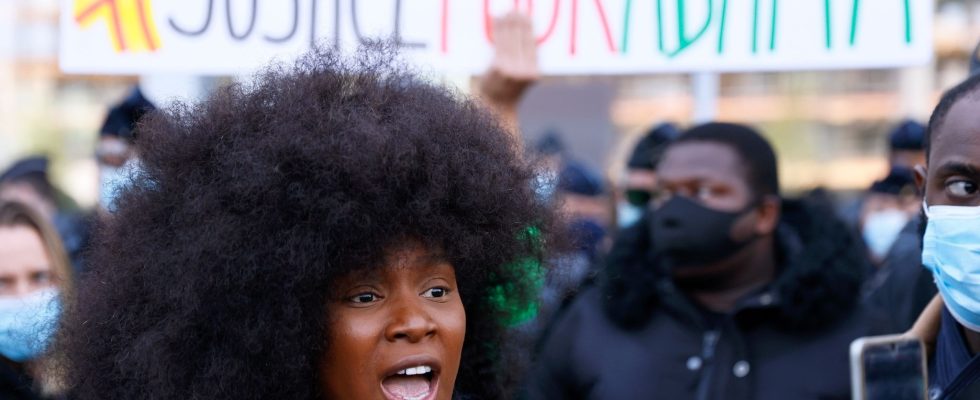Assa Traoré waits for the two people located off camera to finish talking. A male voice gives the green light. The host of the Vérité pour Adama committee launches out: “So here we are on Nanterre. We came to visit the family, the mother.” In the field of the camera, we see the back of Mounia, the mother of Nahel, killed the day before by a policeman. A second and then a third video will be shot this Wednesday, June 28 with Nahel’s mother. In these, she calls for a white march, during which she will be seen wearing the iconic black and white t-shirt that has flourished, with the inscription “Justice for Nahel”. The first name of his son replaced that of Adama Traoré, Assa’s brother, who died on July 19, 2016 following an arrest in Beaumont-sur-Oise (Val-d’Oise).
The speed of the rapprochement may surprise, especially since Assa Traoré did not seem to know Nahel’s mother before the facts. However, the responsiveness of the Adama committee, which campaigns against police violence, is one of its trademarks. His sense of communication is another. Two examples among many: on May 14, 2017, Assa Traoré and a few hundred people marched with a flocked black and white T-shirt “Truth for Curtis”, in tribute to Curtis R., 17, who died nine days earlier in Antony (Hauts-de-Seine) hit by a bus, after fleeing a police check. On October 15, 2017, the committee leader took part in the march in honor of Yacine, 24, who died a month earlier in Aulnay-sous-Bois (Seine-Saint-Denis). The relatives of the victim, who parade dressed in the same black and white T-shirts with the logo this time “Truth for Yacine”, have never believed in the official thesis of his death, that of an overdose. Each time, the presence of the activist and the dress code give an impact to the rally.
“Families support each other”
Youcef Brakni, one of the main executives of the Adama committee, a former member of the Indigenous Party of the Republic, has often told how he “rushed” to Beaumont-sur-Oise when he learned on BFMTV of the troubled circumstances of the death of the brother of Assa Traoré, whom he did not know. Samir Baaloudj Elyes, a former activist from the Movement for Immigration and Suburbs, who has denounced police violence since the 1990s, had the same reaction. The day after the death of Adama Traoré, he approaches the family in front of the town hall of Beaumont-sur-Oise and delivers first advice. The backbone of the committee was born.
Since then, the modus operandi has been the same. When they learn of a suspicious death, the organizers of the organization go there, approach the victim’s entourage by word of mouth or social networks, provide initial support and some political advice. Truth and Justice committees are set up, media events are organised. The militant journalist Taha Bouhafs sometimes accompanies them – we saw him alongside Assa Traoré during the Nanterre march. “Families support each other and the experience of some is useful to others,” he replied to L’Express. Youcef Brakni and Assa Traoré did not wish to speak. The reception is generally good. Sometimes less, as in Nantes in July 2018, when the relatives of Aboubakar Fofana, killed by a CRS while trying to force a roadblock in the Breil district, refuse the assistance of Youcef Brakni and Taha Bouhafs, as the journalist tells Erwan Seznec, in his book My son is not an assassin (Robert Laffont), written with the mother of one of the gendarmes implicated in the Adama Traoré case.
The know-how of the committee and the charisma of Assa Traoré ensure it a greater influence than the weight of the organizations from which its founders come, as will probably be shown by the annual march organized in honor of Adama Traoré in Beaumont-sur-Oise. , on July 8. From the start of the riots, a detail tells of their growing influence on part of the parliamentary left. Since Nahel’s death, the Insoumis deputies Louis Boyard and David Guiraud have regularly used the expression “blacks and Arabs” to describe the inhabitants of working-class neighborhoods under threat of police violence, a way of emphasizing that the issues at stake in the debate are primarily racial. However, this is one of Youcef Brakni’s favorite expressions, which links blunders to past colonization. “When there are struggles in working-class neighborhoods, sometimes we will support but a little from afar, we must not show too much that we are going to defend blacks and Arabs”, regretted the activist in 2019 with the media Regards, by calling on the left to assume this ethnic reading grid. Wish granted.
